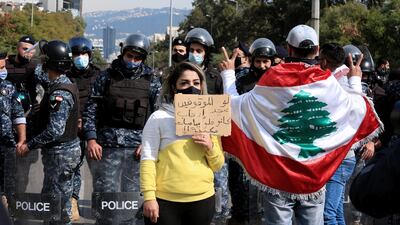Thirty-five protesters were charged with terrorism offences on Monday after deadly demonstrations in Tripoli last month.
Seventeen of them have been detained for almost a month. They are all set to appear before a military court in Beirut.
"This is the first time that we see protesters face terrorism charges en masse," Ali Abbas, a lawyer representing some of the detained, told The National.
“This is a message to protesters: look at what happened to your friends. Stay home and stop demonstrating.”
In the last week of January, protesters took to the streets of Lebanon’s second largest city to demonstrate against deteriorating living conditions amid a strict 25-day lockdown with little financial aid.
Demonstrations turned violent and one protester was killed, reportedly by Internal Security Forces who claimed they used live ammunition in self-defence.
Rioters also tried to storm the Tripoli Serail, the local seat of government, and torched the municipality building.
More than 40 people were detained after the incident, including two minors.
Tripoli is one of the poorest cities on the Mediterranean and became a major protest centre when hundreds of thousands of Lebanese took part in anti-government demonstrations in October 2019.
The city has also been associated with extremism. Deadly clashes between Sunni militants and minority Alawites, members of the same sect as Syrian President Bashar Al Assad, broke out after the start of the Syrian civil war in 2011.
Activists say the terrorism charges are politically motivated and accuse authorities of trying to deter demonstrators as living conditions continue to decline.
Caretaker defence minister Zeina Akar, whose ministry oversees military courts, could not be reached for comment.
Two army sources had told The National that those arrested were suspected of violent acts.
"This is a very serious development," Mr Abbas told The National. "If tomorrow you are protesting and someone throws a rock, they can round up everyone and accuse them of terrorism."
All 35 people prosecuted for the Tripoli protests, whether they were released or remain detained, face the same charges.
These include attempted murder, forming a gang, rioting, insulting the president and assaulting security forces.
The new charges revealed on Monday are related to terrorism and theft of public property after some protesters stole the door to the Tripoli Serail.
Mr Abbas is also an activist at the Popular Observatory to Fight Corruption, a human rights organisation and political group.
Maximum penalties the protesters now face are a death sentence and life in prison with hard labour, he said.
“When someone is charged with terrorism there is no time limit on pretrial detention,” Mr Abbas added. “They could be detained for years.”
Small groups of protesters have been gathering daily in front of the Military Tribunal in Beirut to demand their release.
Mouttaha, an unemployed woman from Tripoli, says she has been commuting to the capital to take part in the sit-ins after one of her friends was detained.
“The people of Tripoli are suffering. We are poor, but we are not terrorists,” Mouttaha said. “They are trying to break the children of Tripoli.”
A session is scheduled for the detained at the Military Tribunal on Wednesday morning.
Those who were released and charged are set to appear before the military investigative judge at a later date.


